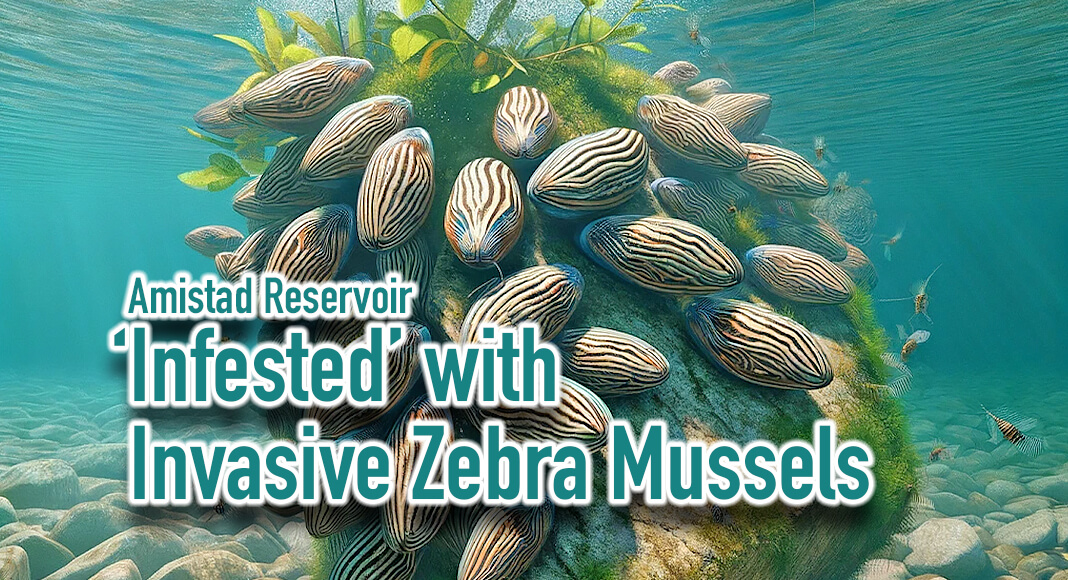
Texas Border Business
Austin, TX – The Texas Parks and Wildlife Department (TPWD) has designated the International Amistad Reservoir in the Rio Grande basin along the Texas-Mexico border near Del Rio as “infested” with invasive zebra mussels, signifying that an established, reproducing population is present in the lake.
Zebra mussel larvae were first detected in the reservoir in June 2022 in a water sample collected by the National Park Service (NPS) at Amistad National Recreation Area. Four additional sites were sampled on multiple dates later in 2023 that resulted in the detection of additional larvae.
The NPS conducted further investigations using shoreline searches, settlement samplers and detection dogs to check for settled juvenile and adult mussels. Despite multiple thorough searches, these size classes of zebra mussels were not found in 2022 or 2023.
Unfortunately, in late February settled zebra mussels were detected at several sites within the lake by the Mexican section of the International Boundary and Water Commission (IBWC), which operates the Amistad dam, and by the NPS. Record low water levels exposed previously submerged rocks and facilitated the discovery of the mussels.
“Since zebra mussels were first detected in Texas in 2009 in Lake Texoma on the Oklahoma border, they have infested 32 water bodies and have been detected repeatedly in four more,” said Monica McGarrity, TPWD senior scientist for aquatic invasive species. “It is disheartening that they have now been spread all the way to our southernmost border, but many Texas lakes remain uninfested, underscoring the importance of boaters doing their part to clean, drain and dry their boats when leaving any lake, every time.”
In 2021 and 2022 larvae of invasive quagga mussels, a close relative of the zebra mussel, were detected in the lake. It was the first detection of quagga mussels in the state of Texas and at that time the public was notified of the presence of invasive mussels in the lake. Quagga mussels have not been detected since May 2022 and their status in the lake remains uncertain. TPWD and NPS continue to monitor the lake for the presence of quagga mussels.
Because zebra mussels are most often transported on or in boats, boaters play a critical role in preventing them from spreading to new lakes. Zebra mussels attach to boats and anything left in the water, including anchors, and can survive for days out of water, often hiding in crevices where they may escape notice. Their microscopic larvae are free-floating and invisible to the naked eye, meaning they can be transported unknowingly in residual water in boats.
TPWD urges boaters to follow these three simple but crucial steps to clean, drain and dry boats and gear before traveling from lake to lake. Remove plants, mud and debris. Drain all water from the boat and gear. Once back home, open compartments and allow everything to dry completely for at least a week, if possible. The NPS has installed cleaning stations at several locations around the lake to aid boaters in their efforts to prevent the spread of invasive mussels.
“We need boaters to help contain the zebra mussels by ensuring that they follow this protocol when they leave Lake Amistad,” said Chris Ryan, superintendent of Amistad National Recreation Area.
If a boat has been stored in the water at Lake Amistad or other lakes with invasive mussels, it is likely now carrying invasive mussels or their larvae and poses an extremely high risk for transporting these invasive species to a new lake. Before moving boats stored in the water at Lake Amistad for a week or more, call the Amistad National Recreation Area at (830) 775-7492 for guidance on inspection and decontamination. Additionally, TPWD can be reached for guidance at (512) 389-4848 or aquaticInvasives@tpwd.texas.gov.
In addition to the harm invasive species can cause to aquatic ecosystems, water infrastructure and the recreational experience at lakes, the transport of these organisms can result in legal trouble for boaters. Transporting prohibited aquatic invasive species in Texas is illegal and punishable with a fine of up to $500 per violation. It’s also the law that boaters must drain all water from their boat and onboard receptacles, including bait buckets, before leaving or approaching a body of fresh water. They must also remove all invasive plants from the boat and trailer before leaving a lake.
For more information on how to properly clean, drain and dry boats and equipment, visit the TPWD YouTube channel for a short instructional video. To learn more about zebra mussels and other invasive species in Texas, visit tpwd.texas.gov/StopInvasives. To learn more about the Amistad National Recreation Area invasive species program, visit https://www.nps.gov/amis/learn/nature/aquatic-invasive-species.html.
TPWD and partners monitor for invasive species in Texas lakes, but anyone who spots them on boats, trailers or equipment being moved can help prevent new introductions by reporting the sighting to TPWD at (512) 389-4848. Anyone who finds invasive species such as zebra mussels in lakes where they haven’t been found before can help identify new introductions by emailing photos and location information to aquaticinvasives@tpwd.texas.gov.
















